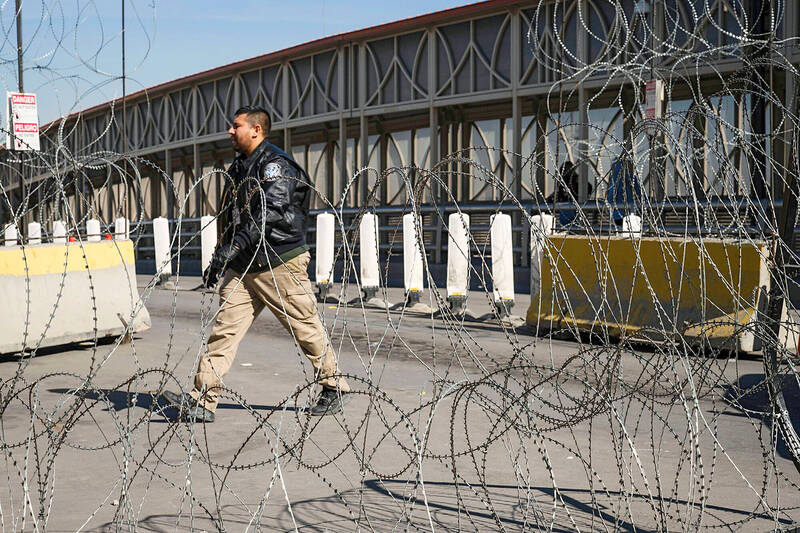Mexico has refused a request from US President Donald Trump’s administration to allow a US military aircraft deporting migrants to land in the country, a US official and a Mexican official said.
US military aircraft on Friday carried out two similar flights, each with about 80 migrants, to Guatemala on Friday, but the government was not able to proceed with a plan to have a C-17 transport aircraft land in Mexico, after the country denied permission.
A US official and a Mexican official confirmed the decision, which was first reported by NBC News.

Photo: Bloomberg
The Mexican Ministry of Foreign Affairs in a statement late on Friday said the country had a “very great relationship” with the US and cooperated on issues such as immigration.
“When it comes to repatriations, we will always accept the arrival of Mexicans to our territory with open arms,” it said.
The Mexican official did not give a reason for the denial of permission to land, while the foreign ministry did not mention the incident.
Trump’s administration earlier this week announced it was re-launching the program known as “Remain in Mexico,” which forced non-Mexican asylum seekers to wait in Mexico until their cases in the US were resolved.
Mexican President Claudia Sheinbaum on Wednesday said that such a move would require the country receiving the asylum seekers to agree, and that Mexico had not done so.
US-Mexico relations have come into sharp focus since Trump started his second term on Monday with the declaration of a national emergency along the two nations’ shared border. He has ordered 1,500 additional US troops there so far, and officials have said thousands more could deploy soon.
It was the first time in recent memory that US military aircraft were used to fly migrants out of the country, one US official said.
In other US diplomacy news, the US Department of State on Friday ordered a sweeping freeze on new funding for almost all US foreign assistance, making exceptions for emergency food programs and military aid to Israel and Egypt.
The order threatened a quick halt to many of the billions of dollars in US-funded projects globally to support health, education, development, job training, anti-corruption, security assistance and other efforts.
The US provides more foreign aid globally than any other country, budgeting about US$60 billion in 2023, or about 1 percent of the US budget.
US Secretary of State Marco Rubio’s order, delivered in a cable sent to US embassies worldwide, specifically exempted emergency food programs, such as those helping to feed millions in a widening famine in warring Sudan.
The cable spells out the execution of the aid-freezing executive order Trump signed on Monday.
Friday’s order did not include specific exemptions for life-saving health programs, such as clinics and immunization programs.
A globally acclaimed anti-HIV program, the President’s Emergency Relief Plan for AIDS Relief, was among those included in the spending freeze, slated to last at least three months.
The program is credited with saving 25 million lives, including those of 5.5 million children, since it was started by former US president George W. Bush.
Additional reporting by AP

Kehinde Sanni spends his days smoothing out dents and repainting scratched bumpers in a modest autobody shop in Lagos. He has never left Nigeria, yet he speaks glowingly of Burkina Faso military leader Ibrahim Traore. “Nigeria needs someone like Ibrahim Traore of Burkina Faso. He is doing well for his country,” Sanni said. His admiration is shaped by a steady stream of viral videos, memes and social media posts — many misleading or outright false — portraying Traore as a fearless reformer who defied Western powers and reclaimed his country’s dignity. The Burkinabe strongman swept into power following a coup in September 2022

‘FRAGMENTING’: British politics have for a long time been dominated by the Labor Party and the Tories, but polls suggest that Reform now poses a significant challenge Hard-right upstarts Reform UK snatched a parliamentary seat from British Prime Minister Keir Starmer’s Labor Party yesterday in local elections that dealt a blow to the UK’s two establishment parties. Reform, led by anti-immigrant firebrand Nigel Farage, won the by-election in Runcorn and Helsby in northwest England by just six votes, as it picked up gains in other localities, including one mayoralty. The group’s strong showing continues momentum it built up at last year’s general election and appears to confirm a trend that the UK is entering an era of multi-party politics. “For the movement, for the party it’s a very, very big

ENTERTAINMENT: Rio officials have a history of organizing massive concerts on Copacabana Beach, with Madonna’s show drawing about 1.6 million fans last year Lady Gaga on Saturday night gave a free concert in front of 2 million fans who poured onto Copacabana Beach in Rio de Janeiro for the biggest show of her career. “Tonight, we’re making history... Thank you for making history with me,” Lady Gaga told a screaming crowd. The Mother Monster, as she is known, started the show at about 10:10pm local time with her 2011 song Bloody Mary. Cries of joy rose from the tightly packed fans who sang and danced shoulder-to-shoulder on the vast stretch of sand. Concert organizers said 2.1 million people attended the show. Lady Gaga

SUPPORT: The Australian prime minister promised to back Kyiv against Russia’s invasion, saying: ‘That’s my government’s position. It was yesterday. It still is’ Left-leaning Australian Prime Minister Anthony Albanese yesterday basked in his landslide election win, promising a “disciplined, orderly” government to confront cost-of-living pain and tariff turmoil. People clapped as the 62-year-old and his fiancee, Jodie Haydon, who visited his old inner Sydney haunt, Cafe Italia, surrounded by a crowd of jostling photographers and journalists. Albanese’s Labor Party is on course to win at least 83 seats in the 150-member parliament, partial results showed. Opposition leader Peter Dutton’s conservative Liberal-National coalition had just 38 seats, and other parties 12. Another 17 seats were still in doubt. “We will be a disciplined, orderly